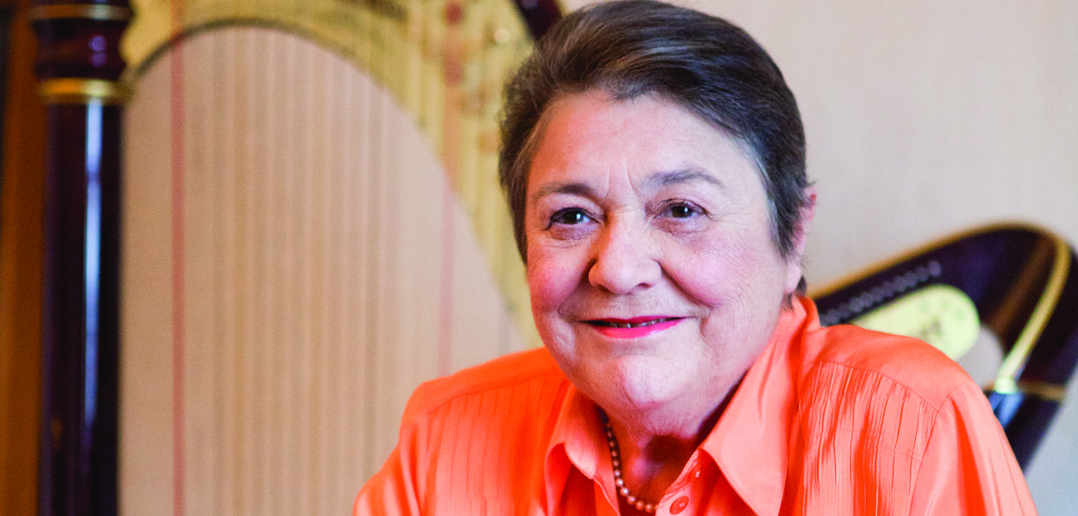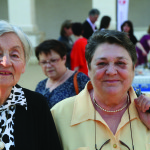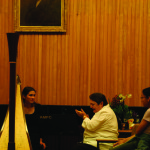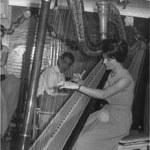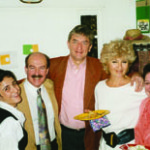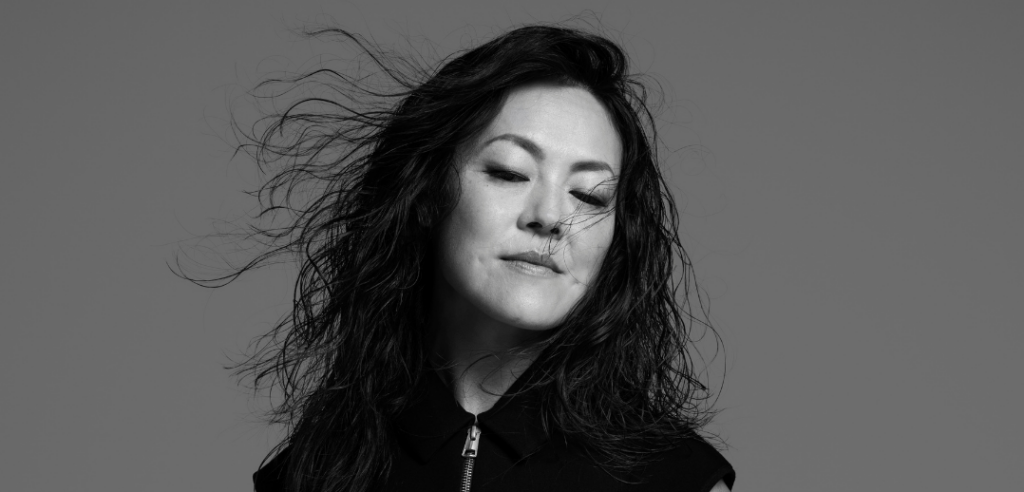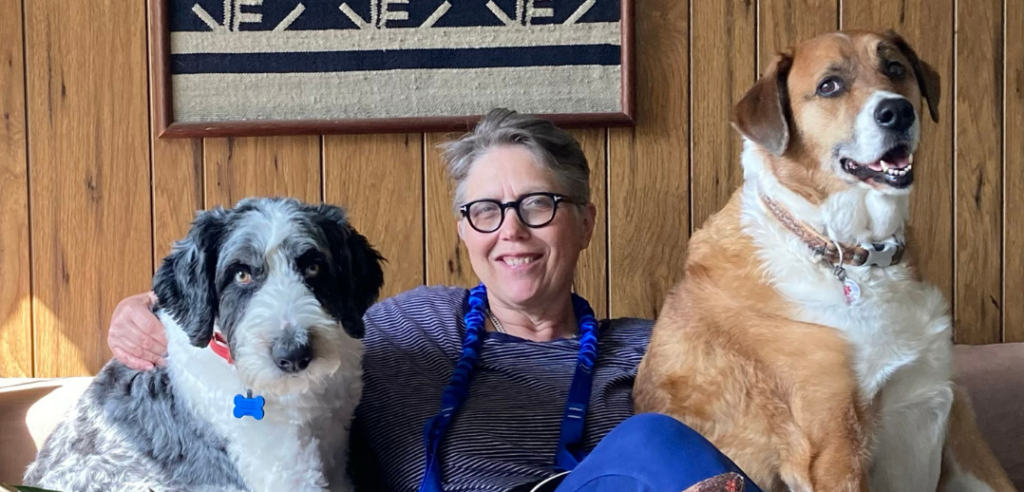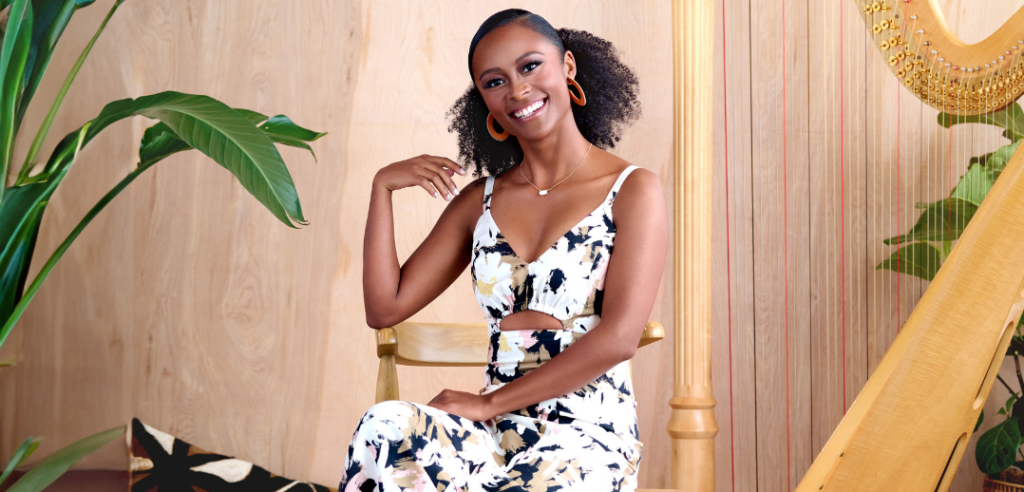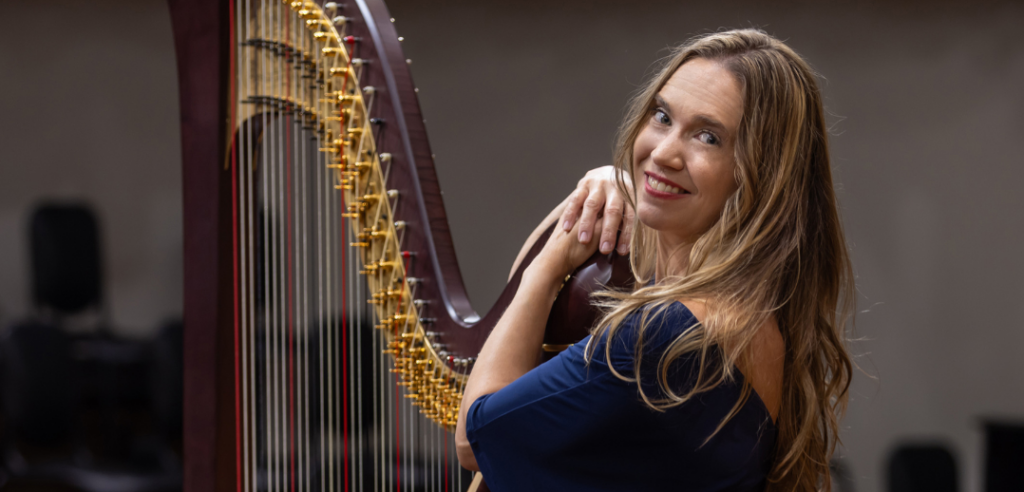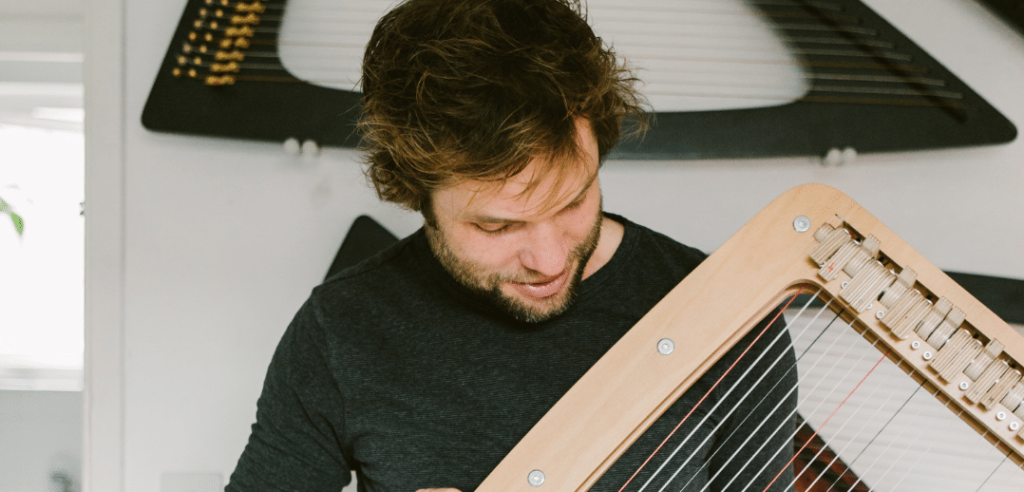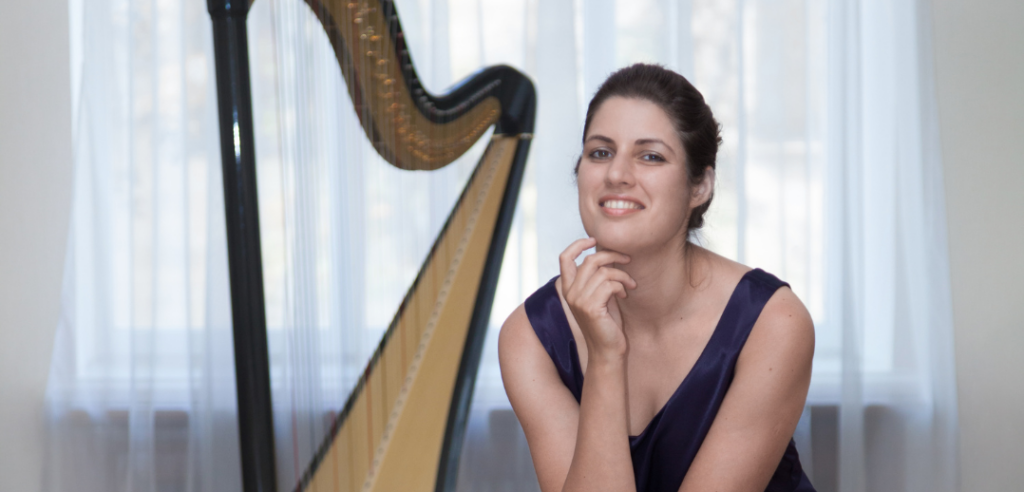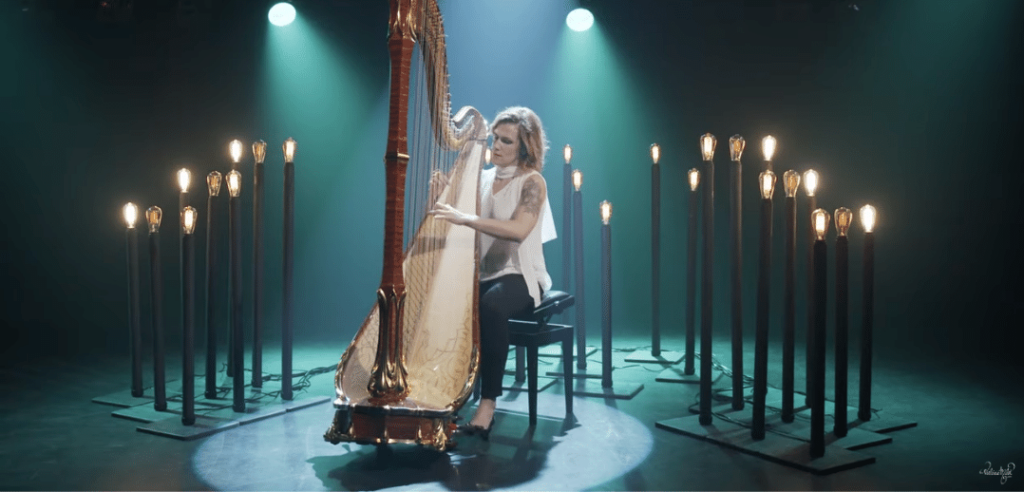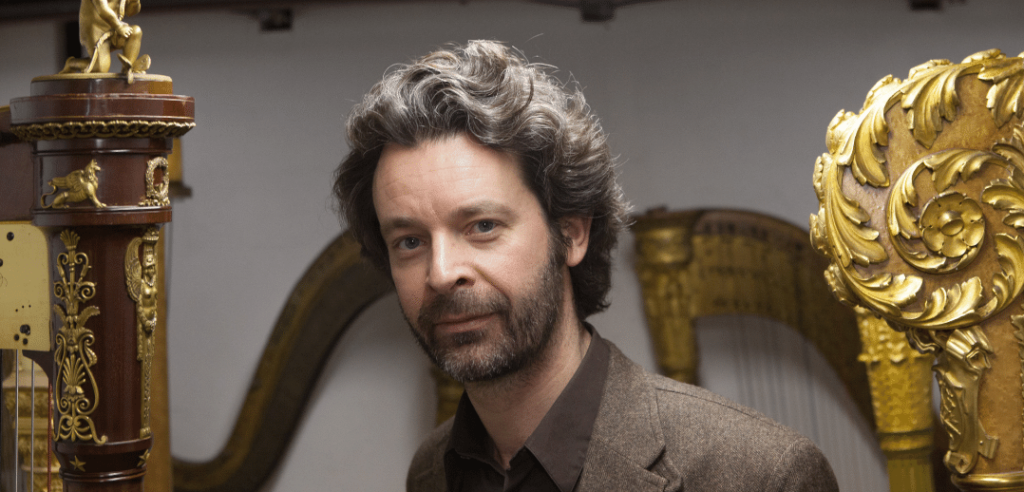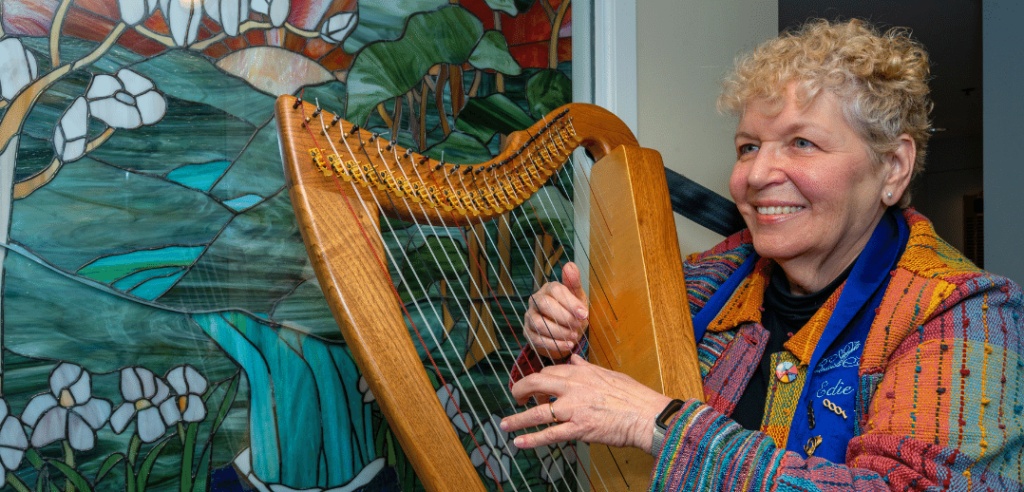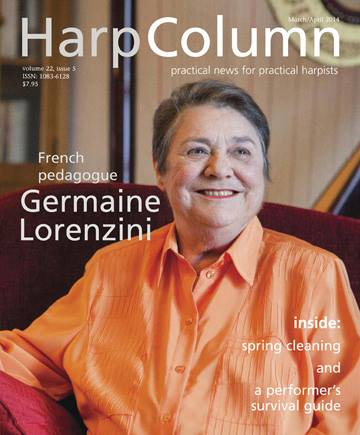- Germaine Lorenzini (right) shares a moment with Marileine Bouchaud at Camac’s 40th birthday celebration in Ancenis, France.
- In demand as a teacher, Lorenzini gives masterclasses all over the world, here in Warsaw, Poland, and Paris (next photo).
- Lorenzini leads a masterclass in Paris.
- Lorenzini on board the cruise ship Moledet on July 23, 1956, en route to the 3rd International Harp Contest in Israel.
- Nearly 40 years later, Lorenzini (far right) is again at the Israel Competition, this time as a juror.
- Lorenzini at the USA International Harp Competition in Bloomington in 1995.
- Lorenzini (second from right) with other jury members at the Wales International Harp Festival in 2010.
Germaine Lorenzini
Lauded in Europe, this uniquely French teacher gives the rest of the world a rare glimpse into her life.
(Read the interview in Lorenzini’s native French here.)
Germaine Lorenzini’s resume reads as you would expect a world-class harpist’s would. She is the honorary harpist of the National Orchestra of Lyon and an active soloist and chamber musician throughout France. She studied with Lily Laskine and then Jacqueline Borot at the Paris Conservatory. She has won prizes at the harp’s top international competitions, including Israel, Geneva, and Tournier.
But it is with her teaching that Lorenzini leaves her most indelible mark. Her students are widely considered to be some of the best harpists in the world, and she is highly sought after as a juror for international competitions.
For those American harpists lucky enough to have experienced, first-hand, a lesson or masterclass with Lorenzini that stretches the better part of the day, you understand her way. For those who haven’t, this conversation with Lorenzini will give you an idea of why students from all over the world trek to her house in Lyon to study with her.
Harp Column: You’ve taught many excellent harpists over the years. Is there a common characteristic you can point to in the best musicians you have taught?
Germaine Lorenzini: Yes. Strong personality. Very different personalities, of course, but all my best students have powerful ones. This is so important: many people can understand, or learn to understand music, but without personality all you are doing is plucking the correct strings. It is the dialogue between the text laid down by the composer and the artist’s individual character that makes a performance special.
It’s the role of the professor to recognize and bring out the student’s character—not impose on them who or how they should be, but perceive and respect them for who they really are. If you are working with somebody who is very young, of course, you have to go looking for the character, a bit. It is your job as a teacher to find it. It is one of the things I love most about teaching.
[protection_text]
HC: Do you think of yourself as a performer first or a teacher first?
GL: When I was younger, I thought of myself more as a performer. These days, I am definitely a teacher first. Teaching is not just something I enjoy or find interesting—it’s much more than that. I am passionate about teaching. To be able to transmit your own experience and also to discover a new person, to come to understand each of your pupils psychologically, to respect them and help them develop and evolve as individual musicians—these are incredible privileges. It is fabulous.
HC: Tell us about studying with Lily Laskine and Jacqueline Borot.
GL: I hugely admired Lily Laskine. I first heard her on a record when I was 8, and I have never forgotten it. Her sound, her manner of playing, her musical freedom, her rhythmic élan, how she held the strings, her suppleness, and her enormous joy in playing—I have never forgotten it. She has always stayed in my ears and before my eyes. She was not a particularly exacting teacher, but I loved her and she inspired.
Jacqueline Borot, on the other hand, was a rigorous teacher. She taught me many things about how to play the harp, but the psychological aspect worked less well. You need to be an astute psychologist in order to get the best from people. It took me a long time to recover my sense of freedom and joy, and to think, et zut! The music is what matters, voilà.
HC: You come from the rich and storied French musical tradition. What characteristics do you think best describe French music and musicians?
GL: French musicians are not very well-behaved! Le irréductible Gaulois—the indomitable Gaul! There is a lot of élan and not always a lot of discipline. Most human beings have their good points and less good points, and French musicians are no exception.
Traditionally, there is not much focus on orchestral playing, although this is changing in the conservatory syllabuses now. In any case, it is a rather soloistic musical culture. You hear this in the orchestras, whose sound can be very brilliant, but not always perfectly clean. It’s not immaculately solid and organized, as it would be in a German orchestra. On the other hand, it is suppler, lighter, more sparkling.
There’s an element of mystery in French music. You either understand it, or you don’t, not at all. Not many foreign conductors, even, can do it. They don’t manage the suppleness—the suppleness within the discipline—and the end result is too heavy.
I think French music can be especially tricky because we don’t have a stable canon of works you can get a handle on. Beethoven, for example, wrote a long series of symphonies. You can immerse yourself in the form, like having a long conversation with him on a particular topic. This, of course, helps you to understand him, in the context of that topic. In France, we write a piece, and then we go off and write something else. We have almost no big symphonies; instead, we have lots of different things—opera, symphonic poems, many solo works. A lot of our orchestral color is very soloistic, such as all the cadenzas of Ravel, or his enormous English horn solo in the second movement of the Concerto in G Major. Debussy wrote just one string quartet! He planned to write a second, but then he didn’t. This is typical of French composers.
Even if you are French, our music’s space of mystery still remains. There are plenty of French musicians who can’t play French music. Or, for example, I once had a student—not French—who played Debussy Danses marvelously. It was stunning. But he couldn’t play Fauré at all. It was strange. And in any case, you can’t categorize every composer the same way. You can’t compare Fauré with Chabrier, or Debussy with Boulez.
HC: Can you tell us about your style and philosophy of teaching and what has informed it?
GL: Honestly? My most fundamental pedagogical decision was not to teach like Jacqueline Borot. You must always respect students, and you must never, ever humiliate them. Humiliation wounds people very deeply, and a teacher should be constructive, not destructive. Your job as a teacher is to transmit, to add something, not take it away.
You help students discover a text. You teach them knowledge of the instrument, of course, and you optimize their capabilities with the harp. You also instruct them in music, teach them the languages of harmony and rhythm. You show them how to understand a composer, not just with the harp but also by listening to his other works, particularly his orchestral works.
You also help them develop their own personality, working with them in ways that suit them psychologically. You cannot work with a naturally timid person in the same way as you do with someone who is over-confident. What is too brutal for one person, and causes them to shrink away from you, is not yet enough to get another to listen. There is a lot of psychology in teaching.
Patience is essential. You have to be prepared to repeat things over and over again.
Rigor is vital too, but equally I don’t think it’s helpful to overdramatize things. Students need to realize that a critique of their playing is not a criticism of them, but rather a series of constructive suggestions about how to improve, which they can then realize. Often, I am hoping to achieve a better hand position or a crescendo that carries on right to the top of the forte—not provoke an existential crisis. A teacher should always keep joie de vivre, enthusiasm for life, and music-making in the student’s sight.
HC: What do you enjoy about teaching?
GL: As I was saying in answer to your first question, I love the exchange offered by teacher and student. On the one hand, you as a teacher have a chance to transmit what you have learned. And on the other, you also have the chance to discover a new personality! Everyone is absolutely unique. This is such a wonderful aspect of humanity, and music is the same. Music is full of emotion in all its facets—it is humorous, serious, seductive, aesthetic, intellectual, entertaining, tragic, jubilant…in music, you’ll find everything that is alive, and all that makes us human. One of the functions of great art is to show us we are not alone.
HC: Can you pick a couple of highlights from your performing career to share with us?
GL: I think my most exhilarating memory is of the first time I played a concerto with orchestra. When I was 14, I was selected to perform Pierné’s Konzertstück. I had Laskine’s recording, with which I practiced. When I got on the stage and finally played with the real orchestra, wow! It was extraordinary. Lily Laskine came to that concert. She knew it was my first concerto. I think it was okay. [Laughs]
I had some other fine experiences, but none as memorable as that one.
There have also been special moments beyond my performing career. Discovering the then 8-year-old Isabelle Moretti, for example. I heard straight away that here was something exceptional. Also, the first time I heard Lily Laskine live in concert, experienced first-hand her sound, and her personality, her radiance, her grace. My own time in the orchestra could sometimes be rather boring, but not when great soloists came, people like Jessye Norman, Kiri Te Kanawa, or Elisabeth Schwarzkopf. I found it incredible to meet these artists, these personalities, live on stage.
I also remember the first time I went to the opera. It was Bizet’s Carmen, and I was 8 years old. I was bowled over when the overture began: it was electrifying.
HC: How would you describe a musician’s life?
GL: A bit nomadic. There is so much traveling, all the touring, concerts in different towns—this can be lonely, as can the personal work you have to do by yourself in the practice room. Equally, the fact that you move around a lot, like a solitary pinball, provokes a wide variety of meetings with others, and these can be very enriching. You experience a lot of different countries and cultures, you meet a lot of different sorts of people and colleagues. As musicians, our spirits need to be open to diverse influences. They develop our imagination, which helps us to understand a text, to perceive it more deeply.
HC: Tell us about the Camac Académie and what you hope to accomplish with the students who will study with you there.
GL: L’Académie Camac is special because it is a chance to work intensely, but also in a relaxed setting. I hope that means that students will be able to work freely, not in order to compete, but in a spirit of joy. There is so much pressure on students to compete—you have to compete for jobs, places at conservatoires, in competitions. Students don’t get enough time with their music in a way that mirrors why we make music at all. We become musicians because we love music, because we can’t imagine our lives without it, because despite all its challenges, we would be poorer without it.
It’s also very important that the numbers at the Académie are so small, and the conditions so fine. You cannot achieve exceptional results without exceptional working conditions; compromising on this is a false economy. I’m very honored to be invited to lead the first Académie.
There might be just a small element of competition…I’m going to teach everyone how to play boules de pétanque (a traditional French lawn game)!
HC: Has music always been a part of your life? How did you come to the harp?
GL: Music has always been part of my life, yes. I remember, when I was very small, I must have been about 4 or 5, and we still had the old 78 records. I couldn’t yet read, but I remember these records as circles of color. You had to turn the records over, and I learned how to do this. I didn’t listen to the radio, because it didn’t play classical music when I wanted it to. Instead, I would climb on a chair and turn my record over and listen to that. I can’t remember all the ones I had, but one was the William Tell Overture by Rossini. I also had some opera, La Bohème, I think. And I had some variety music, but I didn’t like that, so I didn’t listen to it.
I used to take two sticks and rub them together, as if I were playing a violin. My mother went to the professional music teacher nearby, who was a harp teacher, to ask her advice. She said I was too small to learn the violin, and it would give me a backache. So I learned the harp. I got a backache anyway because they gave me a 47-string harp, and I wanted to play the violin. My mother and my teacher said I could learn the violin once I understood the harp. In the meantime I was already 14 and preparing the audition for the Paris Conservatory with Lily Laskine. In the end, I stuck to the harp!
HC: What do you think is the biggest challenge young harpists face today?
GL: To be the best. There aren’t many places, even fewer jobs. It’s like a sport, there is only one medal at the end of each opportunity. To get somewhere, you have to be the best, on that day. To be optimally prepared musically, physically, and psychologically, that’s a big challenge. You have to be very strong psychologically.
HC: On the other hand, what do you think is easier for young harpists today than it was a generation or two ago?
GL: Nothing. Life has never been easy for musicians and that hasn’t changed, not in France, at least. It’s expensive to study and live in Paris—or New York—and it’s expensive to buy a harp. There are some scholarships, but they do not approach covering all your expenses. There is a significant process of selection by money and position. Talented people are born into all walks of life, all social classes, and talent is not hereditary. Nonetheless, if your parents are rich enough easily to buy you a fine harp, rent you an apartment in Paris, pay your tuition fees, and if you are the daughter of well-known musicians to boot, it will be easier for you. That’s because music is not a commercial process. You have to put money in, along a one-way street, financially speaking. You get riches out, which are beautiful and profound and real, but they are not fiscal. You cannot pretend that money is not an issue. Young musicians need to be very brave, very courageous. I have a student who waits tables every night, to finance his studies. He doesn’t have a harp, so he has to practice at a conservatory, when the harp is free, when a room is free. That complicates your life. You have to be strong.
It takes courage to decide to be a musician, and often, it takes courage to decide not to be one. A responsible teacher also, sometimes, needs to have enough integrity to inform a student that they do not think their chances of a musical career are realistic. You sometimes have to tell someone, kindly and tactfully, that if they continue, they are running the risk that they will not find enough work as a harpist. What they actually do is up to them, but you should not keep them in the dark. That’s a betrayal of the trust the student places in a teacher. How can they believe your compliments, if you are too scared to offer them anything on the other side? Nobody does everything wonderfully, all the time.
Most people come up against difficulties in their lives, and a life in music is not easy anyway. My advice to young harpists would be this: music has to be a vocation, so you will do everything it takes to survive and to continue playing your instrument. If you don’t have this fire within your soul, then you don’t have to do it, because goodness knows, there are many other ways to have a wonderful career and a wonderful life. You may have exceptional talents, which happen to lie elsewhere. It is simply that if you don’t have a calling for music, I would be very surprised if you end up making music your career. If you do have one, you already know it. It is and it will be your steadfast companion, helping you overcome significant challenges, on the road to success. •
—Interview translated by Helen Leitner; photos of Germaine Lorenzini by Jakez François and Jean-Marc Volta.





